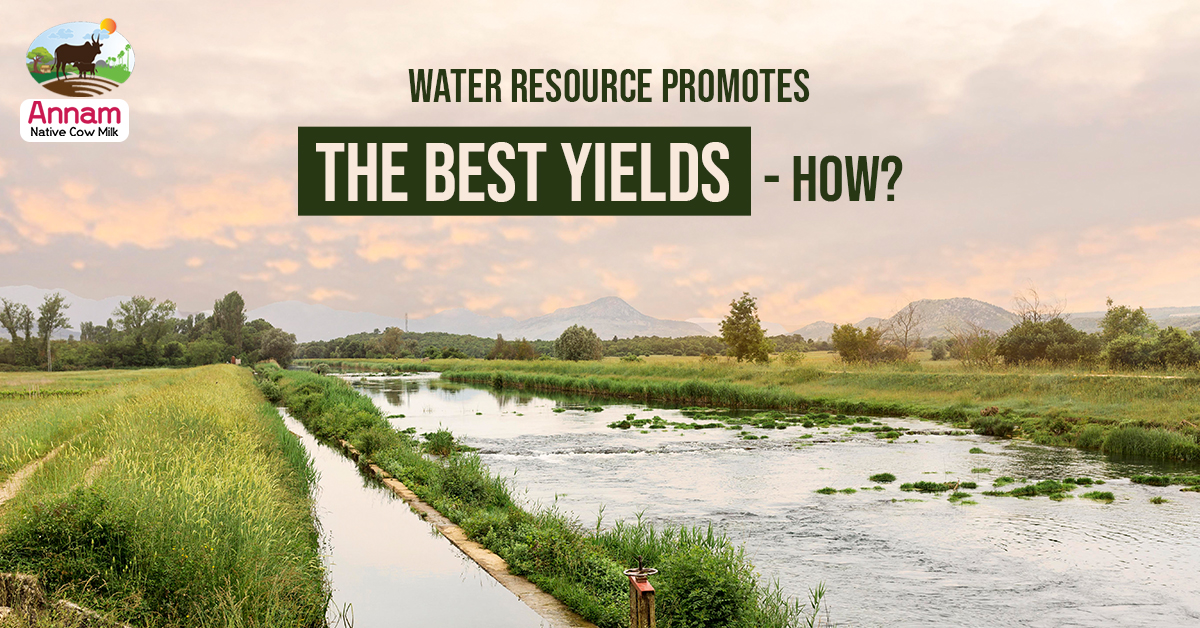Water, the elixir of life, plays a pivotal role in agriculture, serving as the lifeblood for crops and fostering optimal yields on farms worldwide. Annam Milk, the best supplier of organic cow milk in Chennai, has curated this blog to learn how water resources contribute to agricultural success, exploring the intricate relationship between water and crop productivity.
Essential Nutrient Transportation:
Water is a carrier for essential nutrients, facilitating their absorption by plant roots. Without an adequate water supply, plants struggle to take up vital nutrients from the soil, hindering their growth and overall productivity. Hence, we at Annam Farms carefully choose our cultivation seeds that stand against harsh weather conditions, unlike the hybrid ones.
Photosynthesis & Energy Production:
Photosynthesis, the process by which plants convert sunlight into energy, heavily depends on water. Adequate water availability enables plants to use efficient photosynthesis, increasing energy production. This surplus energy is utilized for various metabolic processes, ultimately contributing to higher yields.
Temperature Regulation:
Water has a remarkable capacity to moderate temperature, and this property is especially crucial in agriculture. The surrounding air is cooled through transpiration, where plants release water vapor. This cooling effect helps maintain suitable temperatures for plant growth, preventing heat stress and promoting optimal physiological conditions.
Disease Prevention & Pest Control:
Proper irrigation practices can contribute to disease prevention and pest control. For example, watering at the base of plants reduces humidity on the foliage, creating an environment less favorable for specific pathogens. Additionally, water can be used as a tool for integrated pest management, effectively reducing the prevalence of harmful insects and promoting healthier crops.
Overcoming Drought:
Water resources play a critical role in overcoming the drought and its impact on agriculture. Adequate water availability during dry periods ensures crops can withstand water stress, promoting resilience and preventing yield losses. Implementing efficient irrigation systems and water conservation practices becomes paramount in regions prone to water scarcity. Additionally, our traditional varieties of seeds, which require less water, emerge as the right solution for organic farming. Their ability to thrive with limited water resources aligns seamlessly with sustainable agricultural practices.
Soil Structure & Nutrient Retention:
Water contributes to soil structure by promoting aggregation, preventing soil erosion, and enhancing nutrient retention. Well-structured soil allows for better root penetration and aeration, creating an ideal environment for plant growth. Additionally, water helps bind essential nutrients in the soil, preventing leaching and ensuring crops have a steady supply of nutrients.
Increased Crop Uniformity:
Uniform water distribution across a field is essential for achieving consistent crop growth. Modern irrigation techniques, such as drip and pivot systems, enable farmers to precisely control water application, resulting in more uniform crop development. This uniformity improves overall yields and simplifies other agricultural practices like harvesting.
The significance of water resources in agriculture cannot be overstated. From nutrient transportation to disease prevention and drought resilience, water plays a multifaceted role in promoting the best yields on farms. By recognizing the intricate interplay between water and crop growth, Annam organic farms in Chennai harnesses this precious resource to ensure bountiful harvests and secure the future of our food supply.




